初中英语词组辨析
年初中英语常用词语辨析
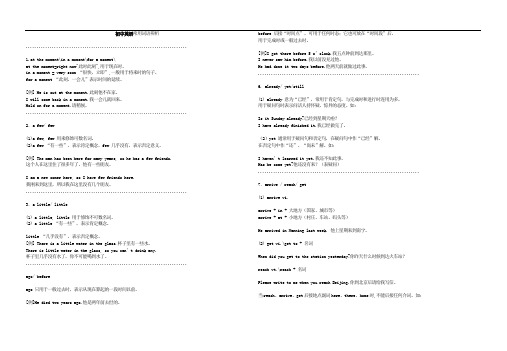
初中英语常用词语辨析..........................................................................1.at the moment\in a moment\for a moment\at the moment=right now"此时此刻",用于现在时。
in a moment = very soon “很快,立即”,一般用于将来时的句子。
for a moment “此刻,一会儿”表示时间的延续。
[例] He is out at the moment.此刻他不在家。
I will come back in a moment.我一会儿就回来。
Hold on for a moment.请稍候。
..........................................................................2.a few/ few(1)a few, few 用来修饰可数名词。
(2)a few “有一些”,表示肯定概念,few 几乎没有,表示否定意义。
[例] The man has been here for many years, so he has a few friends.这个人在这里住了很多年了,他有一些朋友。
I am a new comer here, so I have few friends here.我刚来到这里,所以我在这里没有几个朋友。
..........................................................................3.a little/ little(1) a little, little 用于修饰不可数名词。
(2) a little “有一些”,表示肯定概念。
little “几乎没有”,表示否定概念。
初中英语300组常用词语辨析完整版

初中英语300组常用词语辨析Lesson495.bloom/flower/blossomⅠ.bloom指观赏用的花。
如:玫瑰;菊花;牡丹等。
Ⅱ.flower是普通用语。
Ⅲ.blossom指果树上的花。
96.boat/shipⅠ.boat“船、艇,”是普通用语。
主要指用浆、篙、帆或引擎的小船、小艇,但有时也指大轮船。
如:1We crossed the river by boat.我们乘船过河。
2They pulled the boat up on to the shore.他们把这条船拖上了岸。
(指小船③When does the boat leave for Shanghai?(指轮船Ⅱ.ship“船、舰,”多指大的航海船只。
如:1The ship is at sea.船厂在航海。
2They went to Guangahou by ship.他们乘船去广州。
97.bold/brave/courageousⅠ.bold“大胆的、勇敢的”着重指大胆、勇敢的气质,表现出有胆量、敢闯或敢于对抗而不畏缩。
如:1Be bold!勇敢些!2It’s very bold of us to v enture to go to sea.我们冒险航海是很勇敢的。
Ⅱ.brave“勇敢的”,应用最广泛,通常指在危险、困难或可怕的情况下表现勇猛而畏缩。
如:1Be brave!勇敢些!2It was brave of him to enter the burning building.他敢进入那燃烧着的房屋,真是勇敢。
Ⅲ.courageous“勇敢的,无畏的”表示由于有勇敢的气质或不屈不挠的精神而能无畏地自觉地对付某种事情,常常用于表示道义上的勇敢。
如:1He is courageous in telling the truth.他敢于讲实话。
2We hope that they will courageously shoulder their responsibilities and overcome all difficulties.我们希望能够勇敢地负起责任,克服一切困难。
最新初中英语高频词汇辨析500组

最新初中英语高频词汇辨析500 组A1.about around round 作副词时都含“四处” 、“遍地”的意思。
about系常用词,如: look about around 具有about的基本意思,没有about 正式 , 如 : travel around四处看。
因此look about=look around, 但在下列短语里各处旅行aroundround和 around 在非正式用法中可以互换, 但一般用round时更简练。
在正式用语中, 一般用round指“旋转”, 而用around指“处处”, “到处”, 如 :She turned round at such a noise.听到这样的吵声, 她回头看。
I have been looking for it all around.我到处都找过了。
另外 , 英国人用round 的地方 , 美国人倾向于用around,如:[英 ] Winter comes round.[美 ] Winter comes around.2. above all; after all ; at allabove all 意为“尤其是” 、“首先”、“最重要的是” ,常位于句首或句中,作插入语,起强调作用。
如:But above all tell me quickly what I have to do.可首先快些告诉我该做什么。
A clock must above all keeps good time .时钟最重要的是必须走得准。
after all 意为“毕竟” 、“终究”、“终归”、“到底”,在句中位置较灵活。
可位于句首、句中或句末。
如:After all , your birthday is only two weeks away .毕竟,两周后就是你的生日。
He is, after all , a small child .他毕竟还是个小孩子。
初中英语50组重点词组辨析
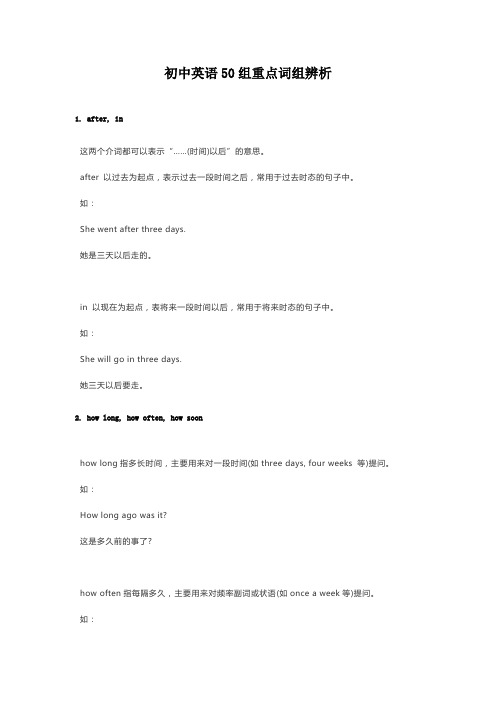
初中英语50组重点词组辨析1. after, in这两个介词都可以表示“……(时间)以后”的意思。
after 以过去为起点,表示过去一段时间之后,常用于过去时态的句子中。
如:She went after three days.她是三天以后走的。
in 以现在为起点,表将来一段时间以后,常用于将来时态的句子中。
如:She will go in three days.她三天以后要走。
2. how long, how often, how soonhow long指多长时间,主要用来对一段时间(如three days, four weeks 等)提问。
如:How long ago was it?这是多久前的事了?how often指每隔多久,主要用来对频率副词或状语(如once a week等)提问。
如:—How often does he come here? —Once a month.他(每隔)多久来一次?每月一次?how soon指再过多久,主要用来对表示将来的一段时间(in an hour, in two weeks 等)提问。
如:How soon can you come?你多快能赶来?3. few, a few, little, a little, several, somefew 和little的意思是否定的,表示“很少”或“几乎没有”;而a few和a little的意思是肯定的,表示“有一些,有一点儿”。
few 和a few修饰可数名词;little 和a little 修饰不可数名词。
several用于修饰可数名词,语意比a few和some更肯定,含有“好几个”的意思。
some可修饰可数名词,也可修饰不可数名词,从数量上说,它有时相当于a few 或a little,有时指更多一些的数量。
4. the other, anotherthe other 指两个人或事物中的“另一个”,表示特指。
初中英语常见词汇辨析

初中英语常见词汇辨析英语近义词辨析1.辨析:such和so:二者都表示程度,“如此;这样”,其区别为:注意:“such+a/an +adj+可数名词单数形式”可与“so+adj+a/an+可数名词单数形式”转换。
She is such a kind girl.=She is so kind a girl.2.each和every注意:each不能与almost,nearly及not搭配使用,而every可以。
Almost every window was broken.Not every student went on holiday.Each不能用于否定句,在否定句中应用none。
None of the books are mine.3.alone与lonelyShe was alone in the dark room.她独自一人呆在那间黑暗的屋子里。
He lives alone but he doesn't feel lonely.他独自生活,但并不感到孤独。
It's a lonely beach.那是一个人迹罕至的海滩。
4.stop doing sth与stop to do sth.One of +可数名词复数:……之一,做主语时,谓语动词要用单三形式。
12/ 1初中英语常见词汇辨析English is one of my favorite subjects.One of my friends knows you.5.few,a few与little,a littleThere are few eggs on the plate,so I must buy some.盘子里没几个鸡蛋了,所以我必须买一些There are a few eggs on the plate,so I needn't buy any at once.There's little milk in the glass.杯子里没多少牛奶了。
初中英语中考词汇辨析(共14组)
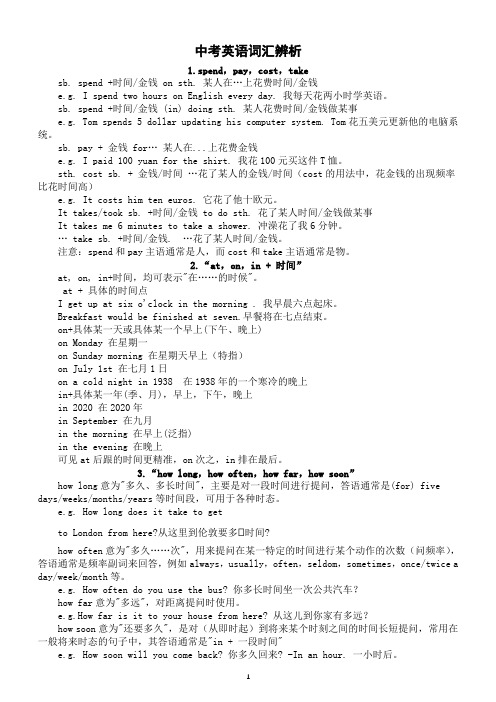
中考英语词汇辨析1.spend,pay,cost,takesb. spend +时间/金钱 on sth. 某人在…上花费时间/金钱e.g. I spend two hours on English every day. 我每天花两小时学英语。
sb. spend +时间/金钱 (in) doing sth. 某人花费时间/金钱做某事e.g. Tom spends 5 dollar updating his computer system. Tom花五美元更新他的电脑系统。
sb. pay + 金钱 for…某人在...上花费金钱e.g. I paid 100 yuan for the shirt. 我花100元买这件T恤。
sth. cost sb. + 金钱/时间…花了某人的金钱/时间(cost的用法中,花金钱的出现频率比花时间高)e.g. It costs him ten euros. 它花了他十欧元。
It takes/took sb. +时间/金钱 to do sth. 花了某人时间/金钱做某事It takes me 6 minutes to take a shower. 冲澡花了我6分钟。
… take sb. +时间/金钱. …花了某人时间/金钱。
注意:spend和pay主语通常是人,而cost和take主语通常是物。
2.“at,on,in + 时间”at, on, in+时间,均可表示"在……的时候"。
at + 具体的时间点I get up at six o'clock in the morning . 我早晨六点起床。
Breakfast would be finished at seven.早餐将在七点结束。
on+具体某一天或具体某一个早上(下午、晚上)on Monday 在星期一on Sunday morning 在星期天早上(特指)on July 1st 在七月1日on a cold night in 1938 在1938年的一个寒冷的晚上in+具体某一年(季、月),早上,下午,晚上in 2020 在2020年in September 在九月in the morning 在早上(泛指)in the evening 在晚上可见at后跟的时间更精准,on次之,in排在最后。
常用英语词语辨析105组

1.elder 与elderly两者都为“年⽼的”,但有细微的差别。
elderly 指中年与暮年之间的年龄,表⽰⼈已过中年,因此,这词常⽤来代替 old。
如:an elderly gentleman. ⼀位年长的绅⼠。
elder指年龄稍长者,适⽤于家庭的兄弟姐妹之间。
如: Tom is the elder of the two.汤姆是两个孩⼦中较⼤的⼀个。
2.precious 和 expensiveexpensive 表⽰“昂贵的”。
如:The drink was cheap , but the food was very expensive . 饮料很便宜,但⾷物很贵。
precious 表⽰“珍贵的,宝贵的”。
如:The children are precious to me . 孩⼦们对我来说很重要。
3.regret to do 和 regret doingregret doing 表⽰“做了某事⽽感到遗憾或后悔”,v-ing 动作发⽣在regret 之前。
如:I regretted missing the train. 我为没有赶上⽕车⽽感到很懊恼。
regret to do 指“当时或现在遗憾地做什么”。
如:I regret to tell you that we can 't stay here any longer. 我遗憾地告诉你,我们不能在这⼉多呆了。
4.day by day 和 day after day两词组意思很近,但有区别:day by day 只⽤作状语,表⽰“⼀天天地”, 有逐渐转变的意思。
如:Day by day she seems to grow a little taller.她似乎⼀天天地长⾼了。
day after day 可作主语,宾语等,亦可作状语,表⽰“⼀天⼜⼀天”,强调动作的重复,表⽰时间的长久。
如: We do the same work day after day. 每天我们做着同样的事情。
中考英语易混词汇辨析
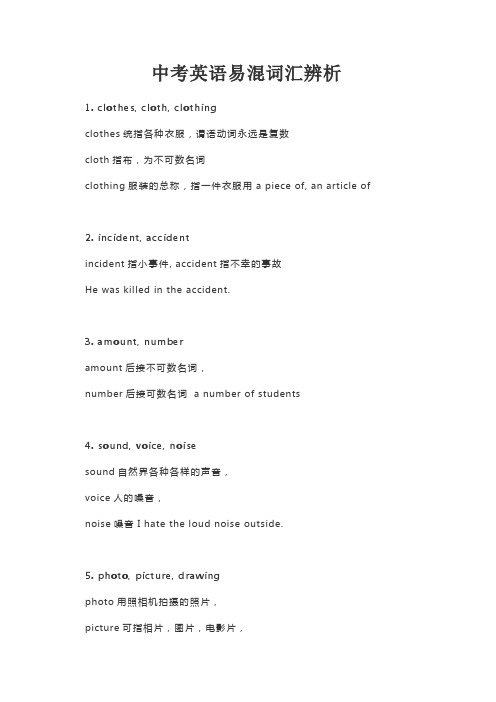
中考英语易混词汇辨析1. clothes, cloth, clothingclothes统指各种衣服,谓语动词永远是复数cloth指布,为不可数名词clothing服装的总称,指一件衣服用a piece of, an article of2. incident, accidentincident指小事件, accident指不幸的事故He was killed in the accident.3. amount, numberamount后接不可数名词,number后接可数名词 a number of students4. sound, voice, noisesound自然界各种各样的声音,voice人的嗓音,noise噪音I hate the loud noise outside.5. photo, picture, drawingphoto用照相机拍摄的照片,picture可指相片,图片,电影片,drawing画的画Let's go and see a good picture.6. weather, climateweather一天内具体的天气状况,climate长期的气候状况The climate here is not good for you.7. road, street, path, wayroad具体的公路,马路,street街道,path小路,小径,way道路,途径take this road; in the street, show me the way to the museum.8. course, subjectcourse课程(可包括多门科目),subject科目(具体的学科)a summer course9. custom, habitcustom传统风俗,习俗,也可指生活习惯,后接to do,habit生活习惯,习惯成自然,后接of doing.I've got the habit of drinking a lot.10. cause, reasoncause指造成某一事实或现象的直接原因,后接of sth./doing sth,reason用来解释某种现象或结果的理由,后接for sth./doing sth. the reason for being late11. exercise, exercises, practiceexercise运动,锻炼(不可数),exercises练习(可数),practice(反复做的)练习Practice makes perfect.12. class, lesson作"课"解时,两者可以替换.指课文用lesson.指班级或全体学生用class. lesson 6; class 513. speech, talk, lecturespeech指在公共场所所做的经过准备的较正式的演说,talk日常生活中的一般的谈话,讲话,lecture学术性的演讲,讲课 a series of lecture on…14. work, job二者均指工作。
初中英语重点词汇辨析
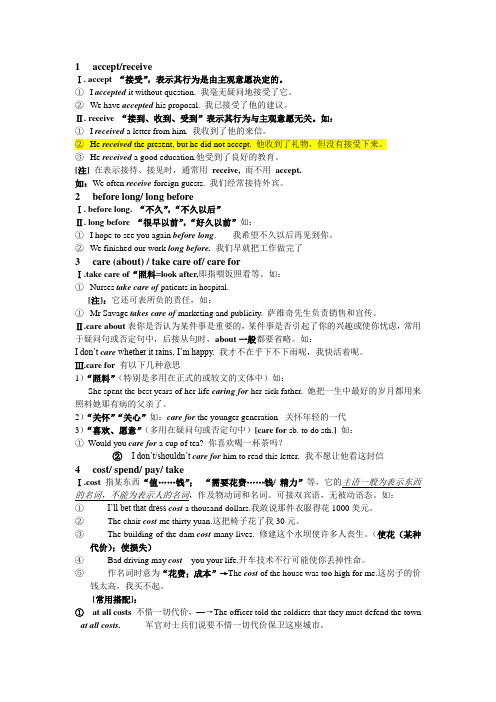
1 accept/receiveⅠ. accept “接受”,表示其行为是由主观意愿决定的。
①I accepted it without question. 我毫无疑问地接受了它。
②We have accepted his proposal. 我已接受了他的建议。
Ⅱ. receive “接到、收到、受到”表示其行为与主观意愿无关。
如:①I received a letter from him. 我收到了他的来信。
②He received the present, but he did not accept. 他收到了礼物,但没有接受下来。
③He received a good education.他受到了良好的教育。
[注] 在表示接待、接见时,通常用receive, 而不用accept.如:We often receive foreign guests. 我们经常接待外宾。
2 before long/ long beforeⅠ. before long. “不久”,“不久以后”Ⅱ. long before “很早以前”,“好久以前”如:①I hope to see you again before long. 我希望不久以后再见到你。
②We finished our work long before.我们早就把工作做完了3 care (about) / take care of/ care forⅠ.take care of“照料=look after,即指喂饭照看等。
如:①Nurses take care of patients in hospital.[注]:它还可表所负的责任,如:①Mr Savage takes care of marketing and publicity. 萨维奇先生负责销售和宣传。
Ⅱ.care about表你是否认为某件事是重要的,某件事是否引起了你的兴趣或使你忧虑,常用于疑问句或否定句中,后接从句时,about一般都要省略。
初中英语词组辨析
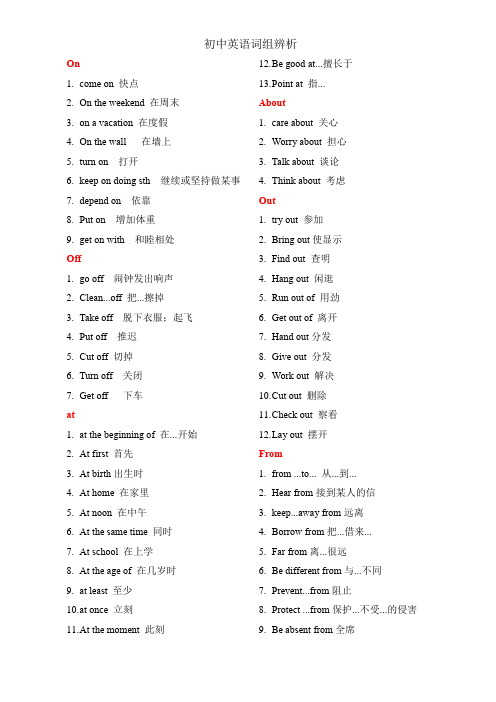
One on 快点2.On the weekend 在周末3.on a vacation 在度假4.On the wall 在墙上5.turn on 打开6.keep on doing sth 继续或坚持做某事7.depend on 依靠8.Put on 增加体重9.get on with 和睦相处Off1.go off 闹钟发出响声2.Clean...off 把...擦掉3.Take off 脱下衣服;起飞4.Put off 推迟5.Cut off 切掉6.Turn off 关闭7.Get off 下车at1.at the beginning of 在...开始2.At first 首先3.At birth出生时4.At home 在家里5.At noon 在中午6.At the same time 同时7.At school 在上学8.At the age of 在几岁时9.at least 至少10.a t once 立刻11.A t the moment 此刻12.B e good at...擅长于13.P oint at 指...About1.care about 关心2.Worry about 担心3.Talk about 谈论4.Think about 考虑Out1.try out 参加2.Bring out使显示3.Find out 查明4.Hang out 闲逛5.Run out of 用劲6.Get out of 离开7.Hand out分发8.Give out 分发9.Work out 解决10.C ut out 删除11.C heck out 察看12.L ay out 摆开From1.from ...to... 从...到...2.Hear from接到某人的信3.keep...away from远离4.Borrow from把...借来...5.Far from离...很远6.Be different from与...不同7.Prevent...from阻止8.Protect ...from保护...不受...的侵害9.Be absent from全席10.S eparate from分离11.B e made from由...制造with1.to start with 起初2.Along with连同;除...以外3.be good with善于应付的4.be strict with sb对某人要求严格5.be born with天生具有6.befriends with sb成为某人朋友e up with提出pare...with比较;对比9.Connect...with把。
初中英语常用词语辨析完整版
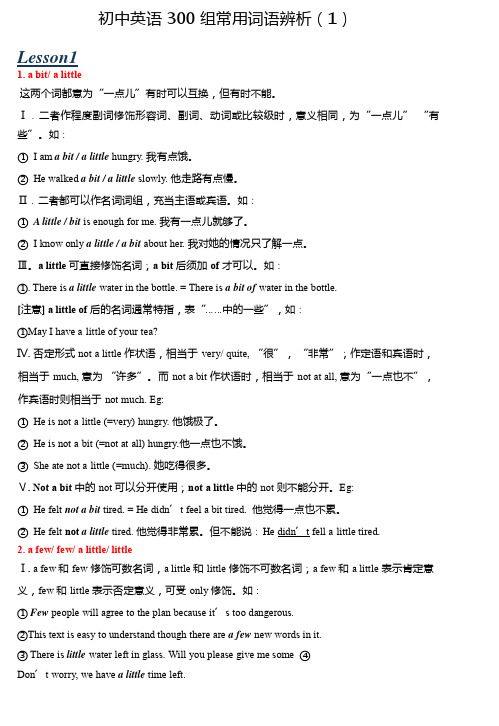
初中英语 300 组常用词语辨析(1)Lesson11. a bit/ a little这两个词都意为“一点儿”有时可以互换,但有时不能。
Ⅰ.二者作程度副词修饰形容词、副词、动词或比较级时,意义相同,为“一点儿”“有些”。
如:①I am a bit / a little hungry. 我有点饿。
②He walked a bit / a little slowly. 他走路有点慢。
Ⅱ.二者都可以作名词词组,充当主语或宾语。
如:①A little / bit is enough for me. 我有一点儿就够了。
②I know only a little / a bit about her. 我对她的情况只了解一点。
Ⅲ。
a little 可直接修饰名词;a bit 后须加of 才可以。
如:①. There is a little water in the bottle. = There is a bit of water in the bottle.[注意]a little of后的名词通常特指,表“……中的一些”,如:①May I have a little of your tea?Ⅳ. 否定形式 not a little 作状语,相当于very/ quite, “很”,“非常”;作定语和宾语时,相当于much, 意为“许多”。
而not a bit 作状语时,相当于not at all, 意为“一点也不”,作宾语时则相当于not much. Eg:①He is not a little (=very) hungry. 他饿极了。
②He is not a bit (=not at all) hungry.他一点也不饿。
③She ate not a little (=much). 她吃得很多。
Ⅴ. Not a bit中的not 可以分开使用;not a littl e 中的not 则不能分开。
Eg:①He felt not a bit tired. = He didn’t feel a bit tired. 他觉得一点也不累。
初中英语常用词组辨析

初中英语常用词组辨析(30组)1、Look和See都是“看”的意思。
look是不及物动词,一般单独使用,look at是及物动词,后可接所看的事物,东西,see也是及物动词,后可接所看的人,电影等。
如:a. look一词单独用时,表示“看!”,通常要放在句首。
如:Look! There is a monkey in the tree. 看!树上有一只猴子。
b. look at表示要看具体的内容,如人或物。
如:Don’t look at me. Look at the b lackboard, please. 不要看我,请看黑板。
c. see表示看的结果,即“看到;看见”。
如:Can you see the words on the blackboard? 你能看见黑板上的字吗?see也用于“看电影”这个词组中,即:see a film2、Spend take paypay 的主语必须是人: (sb) pay money for sth. / pay sb.for sth.;spend的主语必须是人: (sb.) spend money/...for/on sth./ in doing sth. 在......方面花钱或精力;take 表示做某事花费多少时间, 其主语一般是一件事; 有时也可以是人: It takes/ took sb. some time to do sth. 强调完成动作所花费的时间。
①It takes sb. some time to do sth.It took him half an hour to finish his homework. 他花了半个小时完成家庭作业。
②sb. spends some time/money on sth./(in) doing sth.I spent thirty yuan on this book. 我三十元买了这本书。
She spent ten minutes (in) getting there. 她10分钟到达那儿。
词组辨析(七年级)
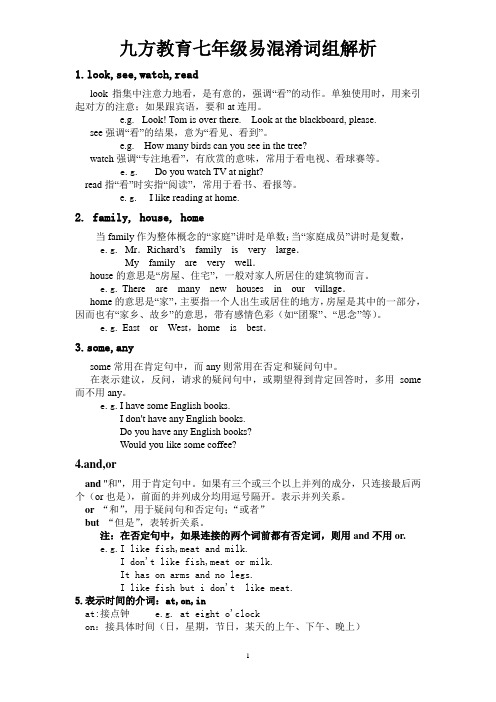
1.look,see,watch,readlook指集中注意力地看,是有意的,强调“看”的动作。
单独使用时,用来引起对方的注意;如果跟宾语,要和at连用。
e.g. Look! Tom is over there. Look at the blackboard, please.see强调“看”的结果,意为“看见、看到”。
e.g. How many birds can you see in the tree?watch强调“专注地看”,有欣赏的意味,常用于看电视、看球赛等。
e.g.Do you watch TV at night?read指“看”时实指“阅读”,常用于看书、看报等。
e.g. I like reading at home.2. family, house, home当family作为整体概念的“家庭”讲时是单数;当“家庭成员”讲时是复数, e.g. Mr.Richard’s family is very large.My family are very well.house的意思是“房屋、住宅”,一般对家人所居住的建筑物而言。
e.g. There are many new houses in our village.home的意思是“家”,主要指一个人出生或居住的地方,房屋是其中的一部分,因而也有“家乡、故乡”的意思,带有感情色彩(如“团聚”、“思念”等)。
e.g. East or West,home is best.3.some,anysome常用在肯定句中,而any则常用在否定和疑问句中。
在表示建议,反问,请求的疑问句中,或期望得到肯定回答时,多用some 而不用any。
e.g.I have some English books.I don't have any English books.Do you have any English books?Would you like some coffee?4.and,orand "和",用于肯定句中。
初中英语常用词语辨析

初中英语常用词语辨析..........................................................................1.at the moment\in a moment\for a moment\at the moment=right now"此时此刻",用于现在时。
in a moment = very soon “很快,立即”,一般用于将来时的句子。
for a moment “此刻,一会儿”表示时间的延续。
[例] He is out at the moment.此刻他不在家。
I will come back in a moment.我一会儿就回来。
Hold on for a moment.请稍候。
..........................................................................2.a few/ few(1)a few, few 用来修饰可数名词。
(2)a few “有一些”,表示肯定概念,few 几乎没有,表示否定意义。
[例] The man has been here for many years, so he has a few friends.这个人在这里住了很多年了,他有一些朋友。
I am a new comer here, so I have few friends here.我刚来到这里,所以我在这里没有几个朋友。
..........................................................................3.a little/ little(1) a little, little 用于修饰不可数名词。
(2) a little “有一些”,表示肯定概念。
little “几乎没有”,表示否定概念。
初中英语常用词语辨析
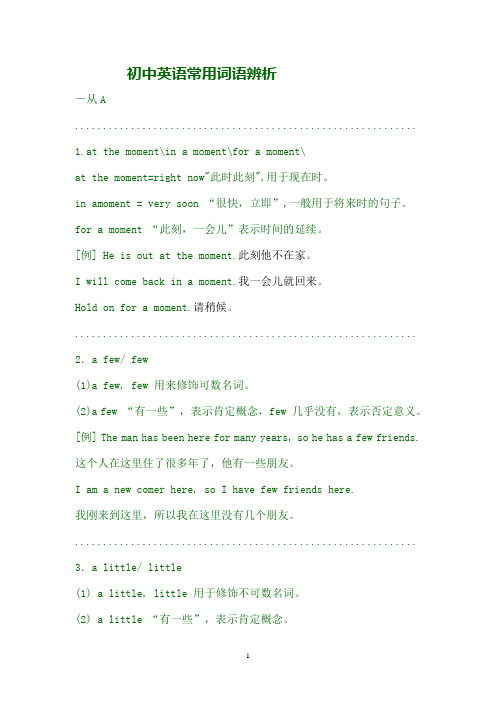
初中英语常用词语辨析-从A .............................................................1.at the moment\in a moment\for a moment\at the moment=right now"此时此刻",用于现在时。
in amoment = very soon “很快,立即”,一般用于将来时的句子。
for a moment “此刻,一会儿”表示时间的延续。
[例] He is out at the moment.此刻他不在家。
I will come back in a moment.我一会儿就回来。
Hold on for a moment.请稍候。
............................................................. 2.a few/ few(1)a few, few 用来修饰可数名词。
(2)a few “有一些”,表示肯定概念,few 几乎没有,表示否定意义。
[例] The man has been here for many years, so he has a few friends. 这个人在这里住了很多年了,他有一些朋友。
I am a new comer here, so I have few friends here.我刚来到这里,所以我在这里没有几个朋友。
............................................................. 3.a little/ little(1) a little, little 用于修饰不可数名词。
(2) a little “有一些”,表示肯定概念。
little “几乎没有”,表示否定概念。
[例] There is a little water in the glass.杯子里有一些水。
初中英语常用词组辨析
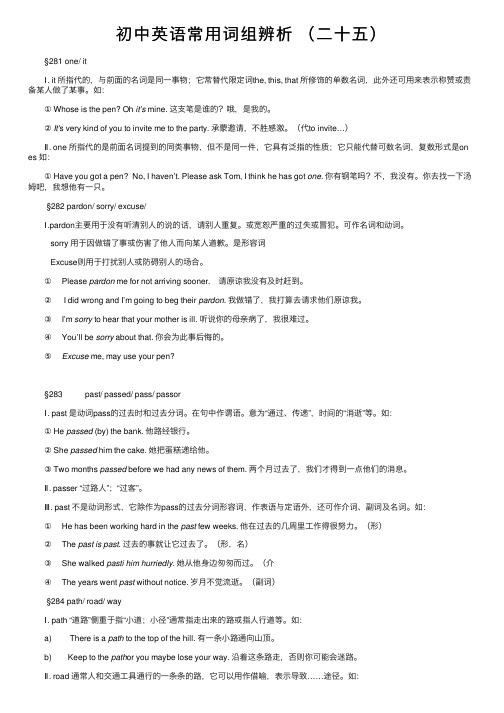
初中英语常⽤词组辨析(⼆⼗五)§281 one/ itⅠ. it 所指代的,与前⾯的名词是同⼀事物;它常替代限定词the, this, that 所修饰的单数名词,此外还可⽤来表⽰称赞或责备某⼈做了某事。
如:① Whose is the pen? Oh it’s mine. 这⽀笔是谁的?哦,是我的。
②It’s very kind of you to invite me to the party. 承蒙邀请,不胜感激。
(代to invite…)Ⅱ. one 所指代的是前⾯名词提到的同类事物,但不是同⼀件,它具有泛指的性质;它只能代替可数名词,复数形式是on es 如:① Have you got a pen? No, I haven’t. Please ask Tom, I think he has got one.你有钢笔吗?不,我没有。
你去找⼀下汤姆吧,我想他有⼀只。
§282 pardon/ sorry/ excuse/Ⅰ.pardon主要⽤于没有听清别⼈的说的话,请别⼈重复。
或宽恕严重的过失或冒犯。
可作名词和动词。
sorry ⽤于因做错了事或伤害了他⼈⽽向某⼈道歉。
是形容词Excuse则⽤于打扰别⼈或防碍别⼈的场合。
① Please pardon me for not arriving sooner. 请原谅我没有及时赶到。
② I did wrong and I’m going to beg their pardon.我做错了,我打算去请求他们原谅我。
③ I’m sorry to hear that your mother is ill. 听说你的母亲病了,我很难过。
④ You’ll be sorry about that. 你会为此事后悔的。
⑤Excuse me, may use your pen?§283 past/ passed/ pass/ passorⅠ. past 是动词pass的过去时和过去分词。
初中英语词汇词组辨析

56.quite ,very 很,十分1quite a +形容词+名词“一个相当……的……”quite a clever boy 一个相当聪明的男孩2a very+形容词+名词“一个非常……的”a very clever boy 一个非常聪明的男孩57.say,speak,talk,tell 说1say 后接说的内容,He says he likes English very much.2speak 后接语言,I can speak Japanese3talk “讨论,谈论”,可作动词也可作名词,talk about sth 谈论某件事,talk with /to sb 和某人谈话4tell ,“告诉,讲述”tell sb sth 告诉某人某件事,tell a story ,tell a lie 撒谎58.since, for 用于完成时态1since 后接时间点. Lucy has lived there since 1955. Lucy 自从1955年以来一直住在这里。
接“时间段+ago”I have been teaching since 10 years ago. 我教英语有10年了接“一般过去时态的句子”We have known each other since we were young.我们从小就认识。
2for 后接时间段。
We have studied for 9 years.我们学英语已经9年了。
59. so , such,如此,这样。
So /such ……that+否定句子=too……to+动词原形;so/such…+肯定句子=enough to+动词原形1so,修饰形容词或many,much,little,few(so good a boy 如此好的一个男孩(so much difficult 太多的困难He is so young that he can’t go to school=He is too young to go to school.他太小了,不能去上学。
九年级英语重点词汇短语词义辨析
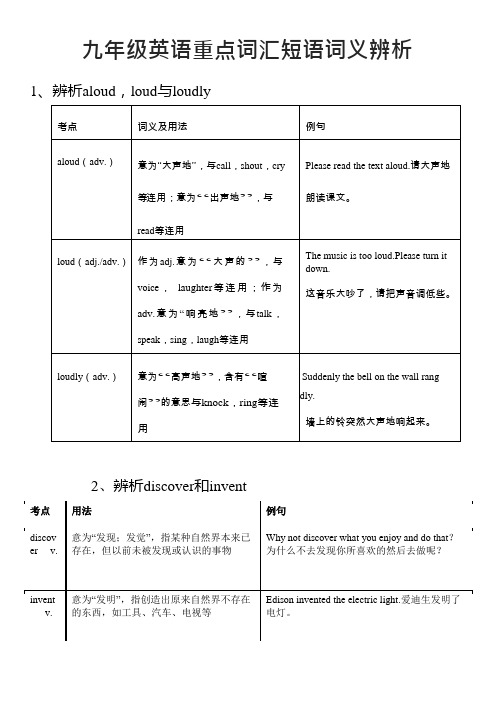
dress
既可表示动作也可表示状态,其后常跟人作宾语
Annie is dressing her sister.安妮在给她妹妹穿衣服。
6、辨析die,dead,dying与death
考点
用法
例句
die
v.死,死亡,指因为生病、年老、负伤等原因而死,是非延续性动词,不能同表示一段时间的状语连用
九年级英语重点词汇短语词义辨析
1、辨析aloud,loud与loudly
考点
词义及用法
例句
aloud(adv.)
意为‘‘大声地’’,与call,shout,cry等连用;意为“出声地”,与read等连用
Please read the text aloud.请大声地朗读课文。
loud(adj./adv.)
He died two years ago.他是两年前去世的。
dead
adj.死的,无生命的,表示状态,可以与表示一段时间的状语连用。如果表达“死了多长时间”,用“have/has been dead for+时间段”或“died+时间段+ago”表示
His grandfather has been dead for ten years.=His grandfather died ten years ago.他的祖父已经去世十年了。
He put on his hat and went out.他戴上帽子出门了。
wear
意为“穿着;戴着”。强调穿/戴的状态
The lady was wearing a dress and sunglasses.那个女士穿着礼服戴着太阳眼镜。
- 1、下载文档前请自行甄别文档内容的完整性,平台不提供额外的编辑、内容补充、找答案等附加服务。
- 2、"仅部分预览"的文档,不可在线预览部分如存在完整性等问题,可反馈申请退款(可完整预览的文档不适用该条件!)。
- 3、如文档侵犯您的权益,请联系客服反馈,我们会尽快为您处理(人工客服工作时间:9:00-18:30)。
初中英语常用词组辨析(31组)1、Look和See答:a. look一词单独用时,表示“看!”,通常要放在句首。
如:Look! There is a monkey in the tree. 看!树上有一只猴子。
b. look at表示要看具体的内容,如人或物。
如:Don’t look at me. Look at the blackboard, please.不要看我,请看黑板。
c. see表示看的结果,即“看到;看见”。
如:Can you see the words on the blackboard? 你能看见黑板上的字吗?see也用于“看电影”这个词组中,即:see a film2、Spend take paypay 的主语必须是人: (sb) pay money for sth. / pay sb.for sth.;spend的主语必须是人: (sb.) spend money/...for/on sth./ in doing sth. 在......方面花钱或精力;take表示做某事花费多少时间, 其主语一般是一件事 ; 有时也可以是人: It takes/ took sb. some time to do sth. 强调完成动作所花费的时间。
① It takes sb. some time to do sth.It took him half an hour to finish his homework.他花了半个小时完成家庭作业。
② sb. spends some time/money on sth./(in) doing sth.I spent thirty yuan on this book.我三十元买了这本书。
She spent ten minutes (in) getting there.她10分钟到达那儿。
③ sb. pays (some money) for sth.He paid a lot of money for the building.他买房子花了许多钱。
表“花费”的动词中,还有一个,即cost:cost 的主语必须是物或事: (sth.) cost(s) sb. money/life/health/time...;This coat cost me eighty yuan.这件上衣花了我80元。
3、on in at1.at介词at表时间、表地点。
(1)at表示时间,用于钟点前,用于时刻前,译为"在......时(刻)"。
如:at three/three o'clock 在三点。
at a quarter to six 六点差一刻。
at noon 在中午,at night 在夜晚, at midnight 在半夜at breakfast/lunch/supper 在吃早饭/午饭/晚饭时at this time of day 在每天这个时候(2)at表示地点,一般用于较小的地名(方)前,译为"在......"。
如:at home 在家,at the station 在车站(3)at表示处于......状态,译为"从事于......"。
如:at school 在上学,at work 在工作【相关链接】at加名词一般可与现在进行时态互换使用,表示正在进行的动作,试比较:They are at work./They are working.2.in小小介词in,用途却很多。
可表时间,表地点,表手段、方法、材料。
(1)in表示时间,用于泛指一天的上午、下午、晚上等;用于某个较长的时间,如年、月、季节等。
如:in the morning/afternoon/evening在上(下午)或晚上,in 2003在2003年,in the day/daytime 在白天【相关链接】in还可以表示"从现在起一段时间以后"。
如:They will see you in a week.他们将在一周后去看你。
另外,in和at都可以表示时间,但in表示较长的时间,而at表示时间的某一点。
例如:He got up late in the morning and had a meal at noon.他早上起得晚,所以只吃午餐。
(2)in表示地点、场所,译为"在......里"、"在......中"。
如:in the factory 在工厂,in the room 在房间里,in the sun 在阳光下,in the middle of...在......的中央【相关链接】in和at都可表示地点,而in表示的地点比at所表示的地点大。
(3)in表示用语言,用......材料。
译为"用......,以......方式"。
如:in English用英语,in ink 用墨水(4)in表示穿戴的状态,译为"戴着、穿着"。
如:in the white shirt穿着白色的衬衫,in the cap 戴着帽子【相关链接】in表示"穿(戴)着"是介词,指状态,同wear一样。
in后接表示服装类的名词或表示颜色的词。
如:Kate is in a red skirt./Kate wears a red skirt.凯特穿着红裙子。
3.on介词on表示时间、地点、方位等。
(1)on表示时间,用于星期、日期(包括该天的各部分)。
如:on Sunday/Sundays,on Monday morning /afternoon/evening等。
on也用于某一日的名词前,用于公共节假日前。
如:On New Year's Day 在元旦,on Children's Day 在儿童节等。
(2)on表示地点、位置,有"在......旁"、"接近"、"靠近"之意。
如:a house on the main road 临大街的房子, sit on my right 坐在我的右边(3)on表示状态,译为"处于......情况中,从事于......"等。
如:on duty 值日,on holiday 度假(4)on表示"在......上面",用在表示物体的名词前。
如:on the box 在盒子上【相关链接】on和over都是介词,on表示"在......上面",指一物体与另一物体表面相接触;over表示"在......上方",指一物体与另一物体不接触。
试比较:There is a light on the desk.桌子上有盏台灯。
(light与desk接触)There is a light over the desk.桌子上方有一盏灯。
(light与desk不接触)【特别提示】表示"在......上",介词on与in必须注意习惯用法,否则会出错。
不妨比较一番:on the tree/in the tree都译为"......在树上"。
前者表示树上本身所长着的叶子、花、果实等;后者表示某物或某人在树上。
on the wall/in the wall都译为"在墙上"。
由于介词不同,在使用上有区别。
图画、黑板、风筝等"在墙上",是因为它们在墙的表面上,故用on the wall;门窗、钉子、洞、孔等"在墙上",是因为它们在墙的里面,故用in the wall。
4、clothes和clothingclothes泛指服装,包括上、下装,内、外衣clothing是衣着的总称,无复数形式,如:man''s clothing5、 a bit与a littlea bit和a littlea bit和a little都有“一点、少许”之意。
两进用作名词时,不能直接跟名词或代词,而必须用介of连接。
如:Well, Mrs Green, may be he has caught a bit of cold.There’s a little (=bit of) time left. 还剩一点儿时间。
She knows a bit (=little) of English. 她懂一点儿英语。
a bit 和a little也可用作副词,后面跟形容词或副词。
如:The jacket is a bit (=little) large. 这件夹克有点大。
That’s a bit expensive. Can I try them on, please?He ran a little faster than me. 他跑得比我快一点。
little还可用作形容词,表示“小的”、“几乎没有”。
如: a little girl(一个小姑娘)、 a little water(有一点水)注意:not a little 和not a bit的意思完全不同,前者是“许多、很”,后者是“一点儿也不”、“毫不”。
试对比:It’s not a bit cold. 天一点儿也不冷。
It’s not a little cold.天很冷。
6、everyday和every dayEveryday是形容词,意思是“日常用的”;every day“每天”是句词短语作状语。
例如:You must pay attention to your ____ English.A. every day’sB. everydayC. everyday’sD. every day7、have to和must首先,两者都可译为“应该”或“必须”,都是情态助动词,这是它们的共同之处;但在用法上有以下重要区别:⑴ have to表示客观条件决定不得不做某事语气较弱;must表示说话人主观的看法,语气较强。
例如:Do I have to say the words?我必须说这些话吗?You must work hard at English.你必须努力学习英语。
⑵must 只有一种形式,而have to有人称、数和时态的形式变化。
例如:She has to go to school earlier.她应当早一点儿上学。
(一般现在时,单数第三人称)I will have to write to him this evening.今晚我必须给他写信。
(一般将来时)He had to look after his sister yesterday.8、look ,look at ,see都是“看”的意思。
